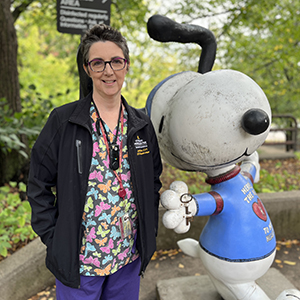Every time you sleep, you enter a much-needed state of limited physical and mental activity. This restorative time gives your brain and body the rest they need to function properly throughout the day.
It's common knowledge that quality sleep is crucial to health, well-being, and professional success—and yet, most people struggle to actually get the sleep they so desperately need. According to the Centers for Disease Control (CDC), one-third of US adults fall short of getting enough rest. Many have sleep disorders or disturbances, while others are simply too busy to commit to healthy sleep routines.
The implications can be devastating for any overtired, under-rested individual, but these are especially serious when health professionals are involved. We will delve into these concerns below and answer the important question: How does sleep affect mental health and well-being?
The Importance of Sleep
Sleep plays a vital role in preserving our physical, mental, and emotional health. Without it, we feel worse and see dramatic drops in academic and professional performance. Below, we've highlighted several of the main ways that sleep (and lack of sleep) impacts health for all types of individuals—health professionals included.
1. Improving Memory
Forget all-nighters: it takes a solid night of sleep to expand your knowledge or skill set. Experts believe that sleep allows the brain to consolidate memories in a way that makes them easier to recall and retrieve later. According to research published in Frontiers, sleep deprivation has a negative effect on our working memory and information-processing capacity. Among students, this manifests in poor academic performance. For health professionals, it can mean forgetting key details about patients or even struggling to remember basic routines or protocols.
2. Enhancing Decision-Making Capabilities
The brain's decision-making mechanisms are far more complex than most people realize. This is largely prompted by the frontal cortex, which is responsible for executive functioning. Often, however, executive function is one of the first areas to suffer when we're short on sleep. This can make us prone to poorly thought-out or downright impulsive decisions.
This unfortunate reality is evidenced in the journal Nature and Science of Sleep, in which a study on the effects of sleep deprivation reveals how quickly risk-taking can enter "deliberative decision-making processes." Study participants who successfully gathered and reflected on a wealth of evidence to complete tasks while well-rested were far less reliant on that evidence when deprived of sleep. Other participants demonstrated a major increase in risky decision-making as they suffered sleep deficiencies.
3. Boosting Creativity
Research suggests that the two main sleep phases—REM (rapid eye movement) and SWS (slow wave sleep)—work together to draw new insights based on consolidated and recently formed memories. During SWS, the hippocampus encourages the neocortex to replace related memories, while REM results in the flooding of the brain with acetylcholine, a neurotransmitter known for firing off messages.
These processes allow the brain to uncover subtle similarities between concepts that do not obviously appear to be linked. Upon waking, these shifts make it easier to look at difficult concepts from new perspectives. Without sleep to facilitate these processes, however, it can be easy to get stuck in the same ways of thinking.
4. Promoting Emotional Stability
Have you ever noticed that, after a poor night's sleep, you feel on edge? Situations that previously would not have felt like a big deal can send you into an emotional spiral. These personal anecdotes are backed by extensive research. For example, a study highlighted in the journal AIMS Neuroscience demonstrates a strong link between sleep and emotional regulation.
Researchers believe that a lack of sleep makes us "sensitive to stressful stimuli," adding that "negative emotional reactivity seems to be significantly enhanced and positive reactions to positive events often subdued" following a poor night of rest. Neuroimaging reveals that, if sleep-deprived, the amygdala (often referred to as the brain's fear response center) is hyperreactive.
The Effects of Sleep Deprivation on Health Professionals
While the problems highlighted above harm people from all walks of life, some concerns surrounding sleep deprivation are specific to health professionals. Unfortunately, these issues can prove downright deadly, particularly if they lead to missed diagnoses or improper treatment protocol. We've highlighted several of the most concerning issues below.
5. Increased Risk of Medical Errors
Medical errors harm an estimated 1.2 million patients every year. While a variety of factors can contribute to these, a growing body of evidence indicates that sleep deprivation often plays a central role. As we've discussed, those who struggle to get enough sleep also struggle with decision-making, and in a demanding field such as health care, this impediment can prove fatal.
Research published in the medical journal JAMA Network Open refers to sleep impairment as an occupational hazard among physicians. The study links various levels of sleep impairment to "self-reported clinically significant medical error[s]," which are far less likely when physicians get enough sleep.
6. Effects on Patient Safety
Not all medical errors result in patient harm, but data highlighted in the resource Medical Error Reduction and Prevention indicates that an annual 400,000 hospitalized patients suffer preventable harm, with 100,000 within hospitals and clinics dying each year as a result of medical errors. Alarmingly, in the JAMA Network Open study highlighted above, the designation as "clinically significant" meant that the medical errors reported in this study occurred within the past year and resulted in patient harm.
7. Impacts on Communication Skills
Strong communication is crucial in the fast-paced health care sector, where professionals must collaborate with a variety of employees to deliver a desirable continuum of care. A domino effect of negativity may occur when one or more employees suffer sleep deprivation and, according to research from Frontier in Neuroscience, sleep deprivation can lead to an aggressive workplace behavior and even bullying.
Patient communication also matters and, unfortunately, is also likely to suffer when health care workers neglect their sleep. This is partially prompted by the emotional difficulties that accompany sleep deficiency. If providers are not sufficiently rested, they simply do not have the capacity to remain as attentive or empathetic amid stressful situations.
8. Impact on Personal Health and Well-Being
Health care professionals require quality sleep not only because it impacts workplace performance but because, simply put, they deserve to feel healthy and happy. Many health workers are too quick to discount this, however, and may be inclined to continue pushing through when their sleep health is clearly suffering. Over time, this can increase the likelihood of burnout, a growing problem across the spectrum of modern health care. Experts believe that sleep is one of the best tools for preventing and mitigating burnout across myriad stressful workplace environments.
Importance of Quality Sleep in High-Stress Professions Like Health Care
Sleep is important not only in the health care sector but also for anyone who works in a high-stress field. Sleep health plays heavily into emotional stability. A single night of poor rest can increase general feelings of irritation, but over time, lack of sleep can lead to even more significant issues.
Burnout, as we've discussed, is a massive problem in health care and a variety of other high-stress fields. As research from the journal Healthcare reveals, this can have a cyclical effect for nurses: sleep loss prompts burnout and vice-versa. A greater focus on quality sleep can limit the potential for burnout while dramatically improving perceptions of work-life balance.
Tips to Improve Sleep Quality
It's no secret that health care workers (and American adults in general) struggle to get enough sleep, but it's important to remember that the quality of sleep is just as important as the number of hours. A night of tossing and turning won't prove particularly restful, but these suggestions may help.
Create a Consistent Sleep Schedule
With sleep, as with most health habits, consistency matters. When possible, aim to settle in for bed and wake up around the same time every day. Eventually, your circadian rhythm should adjust, and you will find it easier to fall asleep quickly and to stay asleep throughout the night. This is understandably difficult when you deal with shift work, but it's not entirely out of reach. Experts from the American Nurses Association (ANA) recommend keeping off-schedule sleep times similar to on-schedule routines when possible. Otherwise, clustering night shifts can also help.
Healthy Diet and Exercise
When you're busy or stressed, you may slide into unhealthy habits, such as excessive snacking or failing to move your body on a regular basis. Unfortunately, these behaviors play heavily into sleep quality and, even when you get enough sleep, can make you feel more tired. A good night's sleep will be more attainable if you've exercised at some point during the day and enjoyed a well-rounded diet that includes plenty of produce and protein.
Mindfulness and Relaxation Techniques
It takes time to implement healthier habits and achieve a more regimented sleep schedule, but these aren't the only issues that stand in the way. Often, stress leads to insomnia, which makes sleep loss even more likely. Look to mindfulness and relaxation techniques to help you get more rest in the short term.
Simply committing to deep breathing or a brief yoga routine could help, but you certainly don't need to go it alone. There are plenty of sleep and fatigue management resources available, such as apps like Pzizz and Sleep Cycle, which promise to help you fall asleep and then wake you up when you're most likely to feel rested.
Learn More, Today
Are you passionate about boosting not only your own health but also the well-being of loved ones and community members? The University of Minnesota's College of Continuing and Professional Studies (CCAPS) encourages you to train for a career that empowers you to help others.
Undergraduate programs in Health Services Management and Health and Wellbeing Sciences prepare you to make a difference where it's needed most. We also offer several graduate-level programs, including the master's of professional studies in Integrated Behavioral Health, Addictions Counseling, and Sexual Health. When you’re ready to learn more, get in touch.
Sources
- Effect of Sleep Deprivation on the Working Memory-Related N2-P3 Components of the Event-Related Potential Waveform, Frontiers
- Effects of Total and Partial Sleep Deprivation on Reflection Impulsivity and Risk-Taking in Deliberative Decision-Making, National Library of Medicine
- Emotion, emotion regulation and sleep: An intimate relationship, National Library of Medicine
- Burnout and Sleep, Sleep Health Foundation
- Health care workers are frazzled – and poor sleep may turn stress into poor mental health, The Conversation
- 4 Actions to Reduce Medical Errors in US Hospitals, Harvard Business Review
- A New Theory Linking Sleep and Creativity, The Atlantic
- Guide to Sleeping Better & Restoring Energy, Well-Being Initiative








